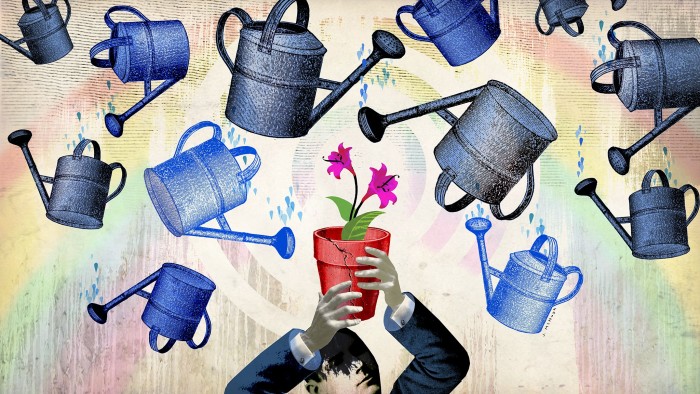Share this @internewscast.com
The writer, an FT contributing editor, is chief executive of the Royal Society of Arts and former chief economist at the Bank of England
For many governments, growth is now treated as a deity. Even those who are broadly inclusive in their political discourse frequently emphasize growth. For the fervent believers, such as the UK government, growth is considered their most important goal. This devotion places them in a constant state of anxiety, where each announcement regarding GDP either becomes a moment of triumph (if results are positive) or a time for reflection and admission of failure (if results are negative).
This strong commitment to a theoretical and largely obscure statistical measure, which has been around for less than a hundred years, seems strange to the average person. However, this focus highlights a new global economic truth: growth has significantly slowed down. For the G7 countries, growth rates in the first 25 years of the 21st century have more than halved compared to the last 25 years of the 20th century.
This slowdown has led to various serious societal issues — it has eroded living standards, increased public debt, and pressured public services. Together, these effects have caused public discontent and, eventually, political volatility. Reviving growth could counteract these strong challenges, both economically and socially, and bring about political stability.
But would it? This century, GDP growth has been no guarantee of rising living standards, especially among lower-income households. In the US, median real incomes have scarcely risen since the 1980s. In the UK, median real pay is lower than at the time of the global financial crisis. No let-up is in sight: incomes for the bottom 50 per cent are expected to be lower at the end than beginning of this parliament, as was the case in the previous one.
During a Brexit referendum debate, an audience member rebuked a panellist with: “That’s your bloody GDP, not ours.” There was statistical truth in this quip. Growth recently in the UK, US and beyond has been anything but inclusive, both geographically and socio-economically. And as Brexit illustrated, non-inclusive growth centred on the well-off and the south-east only adds to public discontent.
The link between income and public satisfaction is a complex one. At levels of income above about $75,000 per person, the link disappears entirely — the so-called Easterlin paradox unearthed in 1974 by US economics professor Richard Easterlin. Above these levels, money really can’t buy you love (or happiness). But even below this threshold, the relationship between income and wellbeing is nuanced.
Based on surveys of citizens, academic Carol Graham’s research suggests upward mobility is more important to public satisfaction than income. For example, poorer communities and countries, where prospects have improved significantly relative to earlier generations, are happier than richer places where generational prospects have faltered or fallen. In short, generational journeys matter more than GDP destinations.
When it comes to wellbeing, then, social mobility trumps national income. Lasting societal success relies more on unlocking opportunity than on maximising output. A different (barely a century old, but less abstract) concept than GDP holds the key to our sense of self, growth and satisfaction — the “American dream” of generational improvement, first discussed by historian James Truslow Adams in 1931.
The American dream has, for many, died. Surveys suggest only around a quarter of Americans now believe “the American dream holds true”. As recently as 2010, it was more than half. The “Opportunity Atlas” constructed by economist Raj Chetty suggests these perceptions accurately reflect a new reality in which social mobility has stalled, or is in retreat, across many parts of the US over the past half-century.
UK measures of social mobility suggest a similar stalling or retreat. The average person today in their twenties and early thirties is earning less than their parents at an equivalent age, after accounting for inflation. Many are less likely to own homes than their grandparents and some than their great-grandparents. For them, the opportunity escalator has stalled or is in reverse.
For many, this starts early in life. In the UK, 4.5mn children grow up in poverty. Poor children are more than twice as likely to be excluded from school and a third fail to make their grades at age 16. Almost 1mn are neither learning nor earning by age 16-24. A generation risks being lost. And today’s lost generation is tomorrow’s lost growth.
In the 19th and 20th centuries, generational progress became a social norm, for the first time in human history. The erosion of social mobility during this century has resulted in an age of truncated aspirations and diminished expectations, stunting growth of individuals, communities and nations.
Michael Young’s The Rise of the Meritocracy painted a dystopian picture of social stratification by academic achievement. Almost 70 years on, that fictional world is today’s reality. The rise of the meritocracy has collapsed the fortunes of those with low or no academic qualifications. Low growth is not its cause, but its effect. Without restarting the opportunity escalator, the pursuit of growth is a fool’s errand.
GDP measures everything except that which is worthwhile. These words of Robert F Kennedy in 1968 are even truer now than then. Stalled social mobility has blocked the only reliable road to sustained wellbeing and growth. In prioritising national growth over local opportunity, governments are praying at the wrong altar and chasing the wrong rainbow. Next week I will discuss how to pursue the right one.









